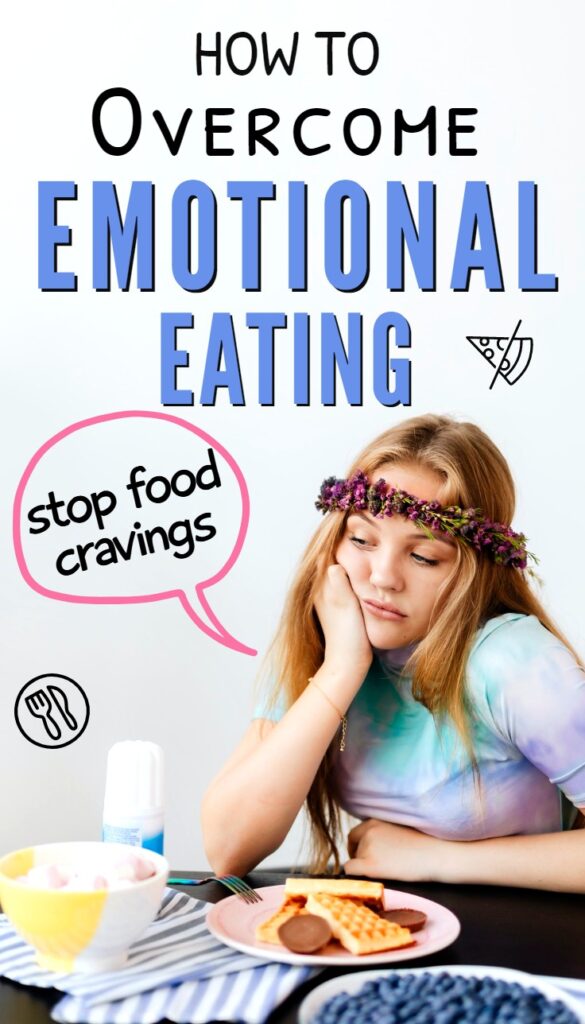Main Causes Of Emotional Eating And How To Stop It
If you reach for food in stressful situations or when you feel sad and can’t stop eating even if you are not physically hungry then you are practicing emotional eating.
Finding comfort in food is so common and you are not alone. But you can stop this practice if you follow these tips to stop emotional eating that we will present to you here.
Here you will learn about the main things of emotional eating that include:
- What is emotional eating?
- Causes of emotional eating
- Tips to stop emotional eating
What Is Emotional Eating?
Reaching for food several times a week or more to suppress or soothe negative feelings can be defined as emotional eating. It is when you eat to fill your emotions rather than your stomach.
The problem with emotional eating is that it doesn’t help you to deal with those negative feelings, instead, it makes it even worse. An emotional problem will not go away, but you will gain weight and feel terrible.
Difference between emotional hunger and physical hunger:
- Emotional Hunger
- Starts suddenly
- Felt mostly in your head or in your thoughts
- Sharp craving that tends to be incessant
- You are fixed on a specific food, texture, taste
- Often leads to eating until uncomfortably full
- May trigger feelings of guilt, regret or shame
- Physical Hunger
- Starts gradually
- Physically felt in your stomach
- Growling pang that tends to come in waves
- You are open to many food options
- Easy to satisfy with a normal amount of food
- Doesn’t make you feel bad about food
Main Causes of Emotional Eating
The root cause of your emotional eating can be anything from stress to financial problems, health issues to relationship problems. Let’s see some of them:
Unawareness
When you are done with your meal but continue to pick at it, slowly eating the remaining portion that you intended to leave behind. Or putting peanuts or snacks in your mouth just because they are in front of you. Therapists call this unconscious eating.
Stress
More stress in your life, more likely that you will turn into emotional eating. When we are in a stressful situation (we are most of the time today) our bodies produce high levels of the stress hormone cortisol.
This hormone triggers cravings for foods that are energy boosters like sweet and fried foods. If you don’t know how to deal with stress read this article 10 ways to calm down when you are stressed and anxious.
Difficult Feelings
If you don’t know how to tolerate or deal with difficult feelings in your life you are sustainable to emotional eating. We are thought from a young age to avoid bad things. If you feel unwanted, bad, or sad one of the ways to get away from those feelings is to grab some food.
Childhood Habits
If you like a kid after any success was taken as a reward to eat something good or a big bowl of ice cream and sweets, it is so possible that you’ve developed an emotional attachment to food. People eat to feel better, to celebrate, to deal with problems. And these are the things that we are seeing around us since we were kids.
Tips To Stop Emotional Eating
Find out why you are doing it
All experts will tell you that the first thing you should do to overcome emotional eating is to find out what triggers it. What feelings, places, or situations make you reach for the comfort of food?
Is your physical body hungry or you are feeling sad, lonely, or disappointed? It doesn’t mean that just negative feelings trigger emotional eating. Positive feelings can be the reason for that too.
Let’s say you are rewarding yourself after finishing a task or celebrating a happy event.
Recognize those feelings and spend some time with them. Be able to say “I am sad” or “I am disappointed“. Don’t rush every time in the kitchen to grab something to eat.
The best way to identify what is the cause that is pushing you towards the kitchen is to keep track of food and mood diary. Whenever you get this feeling to reach out for food even if you ate before, stop for a moment to figure out what triggered that urge.
Write it all down in your food diary what you ate or wanted to eat, what happened before, what upset you, how you feel while eating, and afterward. Make a whole picture before while and after eating.
After a while, you will notice a pattern. Maybe you are reaching for food after talking with some friends or having a conversation with family members, doing something difficult at work, etc. By doing this you will identify the emotional triggers and in the future, you will be aware that you are not hungry it is that feeling or emotion that keeps you reaching out for food.
What else you can do to feed your feelings
If you don’t find a way that doesn’t involve food to manage your emotions you won’t be able to control your eating habits. The food will take away the pain but only at that moment. If you want to deal with emotional eating you should find another way to fulfill yourself emotionally.
Next time when you reach for food just stop for a second and think why you are doing that. Are you physically hungry or it is something else?
What can you do in different emotional situations:
If you are tired: make a cup of tea, take a bath or wrap yourself in a warm blanket and if this is happening to you more often read this article: Why am I exhausted all the time?
If you are lonely: call someone to talk or get out with your friends on a cup of coffee or just for a walk.
If you are bored: read a book, watch your favorite TV show (without snacks), clean your house.
Remember emotional eating is about changing your emotional state. We always want to go from discomfort to comfort state and if we do that with food, we have a problem. These are just some examples that can help you out but you should find your alternatives for food that you can turn to for emotional fulfillment.
Pause when the urge to eat hits
Try to put off eating for five minutes when the craving starts. Emotional eating tends to be automatic and before even you realize what you are doing you’ve already eaten half of the ice cream and you aren’t even aware of that.
Make a pause for even one minute before you reach for food and ask yourself “Why am I doing this?” It is enough time to change your decision and realize that you are not physically hungry it’s something else.
The best way to outsmart our brain which urges us to eat even when we don’t want to is to practice mindfulness. In stressful moments the best way is to slow down and take a couple of deep breaths. This resets our nervous system and helps us to make better decisions. These decisions should serve us in the long run and not just provide temporary satisfaction.
Check-in with yourself about how are you feeling, what is going on emotionally. Even if you end up eating after a while it will become a pattern to ask yourself these questions before you start eating. This will help you to set yourself up for a different response next time.
Slow down and enjoy while you are eating
The opposite of mindless emotional eating is mindful eating or slowing down while you eat. When you eat to feed your emotions or stress eating you eat so fast that you miss different textures and flavors of the food. But if you slow down and feel the taste of every bite you will enjoy your food more and the chances of overeating are small too.
So how to start enjoying your food? It is simple to just take a few deep breaths before eating and focus on the experience of eating. Pay attention to food texture, colors, smell, and flavor. By slowing down while you eat you will start appreciating every bite of food you take.
There is another advantage of slow eating. If you eat fast your brain can’t receive information so fast that you are full and that is maybe one of the reasons for overeating. By slowing down your brain gets information that you are full on time and you will not overeat and feel better after.
Another big mistake that you are doing is to eat while you watch TV or on the phone in front of you. Your brain is not concentrated on food.
Your mind receives information from what you are watching and you forget how much you ate. This is important and if you want to know more about this see what is mindful eating.

Final thoughts on how to stop emotional overeating
These are the tips that will help you to stop emotional eating. It is not so easy to stop this practice immediately. Eating to fulfill your emotions or to deal with stress is your habit it is something that you are doing every day.
To overcome emotional eating you must change your lifestyle and the way you see things. Be more physically active, try to sleep at least 7-8 hours every night, make time to relax, connect with other people. Spend more time away from the kitchen and find some hobby.
Nothing will change overnight you must be persistent and work on that if you want to change your life for the better.




